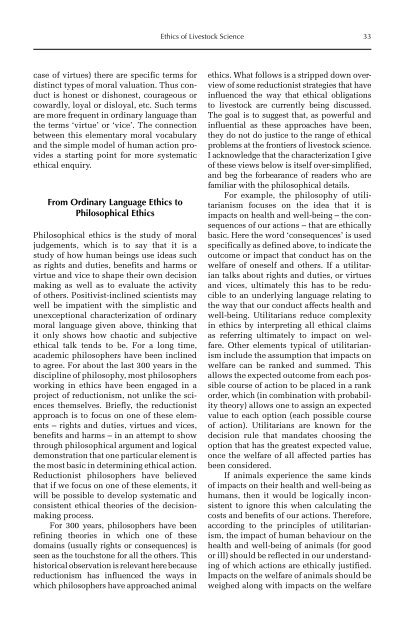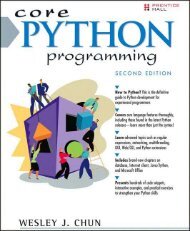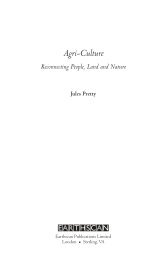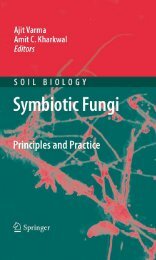Redesigning Animal Agriculture
Redesigning Animal Agriculture
Redesigning Animal Agriculture
You also want an ePaper? Increase the reach of your titles
YUMPU automatically turns print PDFs into web optimized ePapers that Google loves.
case of virtues) there are specific terms for<br />
distinct types of moral valuation. Thus conduct<br />
is honest or dishonest, courageous or<br />
cowardly, loyal or disloyal, etc. Such terms<br />
are more frequent in ordinary language than<br />
the terms ‘virtue’ or ‘vice’. The connection<br />
between this elementary moral vocabulary<br />
and the simple model of human action provides<br />
a starting point for more systematic<br />
ethical enquiry.<br />
From Ordinary Language Ethics to<br />
Philosophical Ethics<br />
Philosophical ethics is the study of moral<br />
judgements, which is to say that it is a<br />
study of how human beings use ideas such<br />
as rights and duties, benefits and harms or<br />
virtue and vice to shape their own decision<br />
making as well as to evaluate the activity<br />
of others. Positivist-inclined scientists may<br />
well be impatient with the simplistic and<br />
unexceptional characterization of ordinary<br />
moral language given above, thinking that<br />
it only shows how chaotic and subjective<br />
ethical talk tends to be. For a long time,<br />
academic philosophers have been inclined<br />
to agree. For about the last 300 years in the<br />
discipline of philosophy, most philosophers<br />
working in ethics have been engaged in a<br />
project of reductionism, not unlike the sciences<br />
themselves. Briefly, the reductionist<br />
approach is to focus on one of these elements<br />
– rights and duties, virtues and vices,<br />
benefits and harms – in an attempt to show<br />
through philosophical argument and logical<br />
demonstration that one particular element is<br />
the most basic in determining ethical action.<br />
Reductionist philosophers have believed<br />
that if we focus on one of these elements, it<br />
will be possible to develop systematic and<br />
consistent ethical theories of the decisionmaking<br />
process.<br />
For 300 years, philosophers have been<br />
refining theories in which one of these<br />
domains (usually rights or consequences) is<br />
seen as the touchstone for all the others. This<br />
historical observation is relevant here because<br />
reductionism has influenced the ways in<br />
which philosophers have approached animal<br />
Ethics of Livestock Science 33<br />
ethics. What follows is a stripped down overview<br />
of some reductionist strategies that have<br />
influenced the way that ethical obligations<br />
to livestock are currently being discussed.<br />
The goal is to suggest that, as powerful and<br />
influential as these approaches have been,<br />
they do not do justice to the range of ethical<br />
problems at the frontiers of livestock science.<br />
I acknowledge that the characterization I give<br />
of these views below is itself over-simplified,<br />
and beg the forbearance of readers who are<br />
familiar with the philosophical details.<br />
For example, the philosophy of utilitarianism<br />
focuses on the idea that it is<br />
impacts on health and well-being – the consequences<br />
of our actions – that are ethically<br />
basic. Here the word ‘consequences’ is used<br />
specifically as defined above, to indicate the<br />
outcome or impact that conduct has on the<br />
welfare of oneself and others. If a utilitarian<br />
talks about rights and duties, or virtues<br />
and vices, ultimately this has to be reducible<br />
to an underlying language relating to<br />
the way that our conduct affects health and<br />
well-being. Utilitarians reduce complexity<br />
in ethics by interpreting all ethical claims<br />
as referring ultimately to impact on welfare.<br />
Other elements typical of utilitarianism<br />
include the assumption that impacts on<br />
welfare can be ranked and summed. This<br />
allows the expected outcome from each possible<br />
course of action to be placed in a rank<br />
order, which (in combination with probability<br />
theory) allows one to assign an expected<br />
value to each option (each possible course<br />
of action). Utilitarians are known for the<br />
decision rule that mandates choosing the<br />
option that has the greatest expected value,<br />
once the welfare of all affected parties has<br />
been considered.<br />
If animals experience the same kinds<br />
of impacts on their health and well-being as<br />
humans, then it would be logically inconsistent<br />
to ignore this when calculating the<br />
costs and benefits of our actions. Therefore,<br />
according to the principles of utilitarianism,<br />
the impact of human behaviour on the<br />
health and well-being of animals (for good<br />
or ill) should be reflected in our understanding<br />
of which actions are ethically justified.<br />
Impacts on the welfare of animals should be<br />
weighed along with impacts on the welfare










